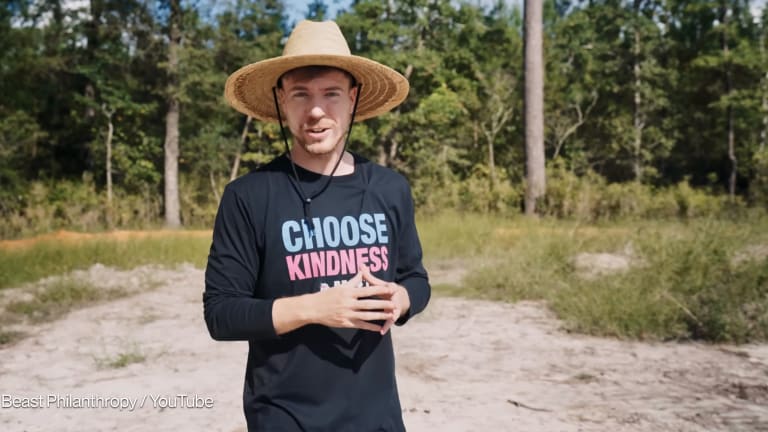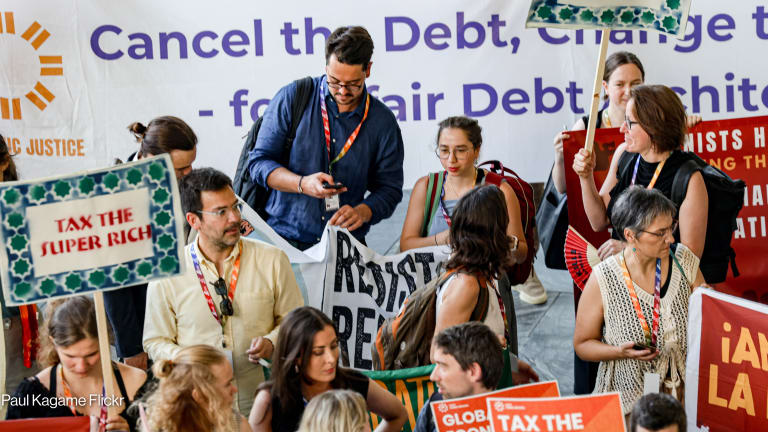Fundraising trips with celebrities: A how-to guide
Taking a celebrity on a fundraising trip can galvanize support for a cause, but it requires careful management and preparation, according to Comic Relief's travel risk manager, Beth Chandler.
LONDON — In today’s celebrity culture, a famous face has the power to transform a fundraising campaign and galvanize support for a cause. The British charity Comic Relief is an old hand when it comes to working with the stars and has raised millions of pounds for international and domestic causes by collaborating with entertainers on appeals. But taking a celebrity on a fundraising trip to visit a project requires careful preparation and management, according to the organization’s travel risk manager, Beth Chandler. It also means striking a balance between using artists to raise publicity for a cause while avoiding insensitivities and stereotypes — such as the “white savior” stereotype, which the charity has been criticized for in the past. It is working to address this by collaborating with celebrities who have a “personal connection to the issue” and giving greater voice in its fundraising materials to people from the countries in question, a spokesperson for the charity told Devex. Speaking at the Borderless conference earlier this year, Chandler offered some tips on what to think about if you’ve decided a celebrity visit is right for your cause. The all-important briefing Make sure performers are well briefed before going on a trip and have a good understanding of the country and context they are going into, Chandler said. This is important to ensure the charity has “informed consent,” but also to counter any myths or misconceptions ahead of time. She recommends having a strong artist liaison team and putting together a comprehensive briefing pack. Sometimes it is impossible to convince a would-be guest that “not everything they’ve read about Africa is relevant to the country they are visiting, and occasionally this means trips are canceled,” Chandler said, citing the example of one celebrity couple who pulled out of a trip to Kenya because they were worried about the Ebola outbreak on the other side of the continent. Prepare for travel contingencies “Be prepared with all the policies and procedures you might need in place before you get the celebrity on board … so you can react quickly and flexibly,” Chandler said. Booking flexible flights, where cost allows, is a must in case things change last minute, she said. Insurance for loss of earnings is also an important topic to discuss with celebrities in case something happens that means they are unable to return to work straight away. While Comic Relief does not cover the loss of earnings, it is crucial to have a conversation with the artist and their agent so they know what will or won’t be covered by the charity, allowing the celebrity to arrange extra insurance cover if they want to. Dealing with demands Celebrities are generally less demanding than people imagine, Chandler said, and are usually happy to fly economy and stay in the same accommodation as the charity’s staff. “Celebrities always donate their time for free and often have very little time on the ground to work with us … If necessary we will consider upgrades to the flight so that they arrive rested and ready to work … so that we can maximize the trip, though many turn this option down,” she said. “We’ve heard stories of people who went on trips with us 20 or 30 years ago that talk about how these experiences remain with them years later.” --— Beth Chandler, travel risk manager, Comic Relief Keeping celebrities safe Being in the public eye can mean celebrities are more at risk when traveling to certain countries, especially if they are a member of the LGBTQ community. “We are putting them in a situation where they could be arrested or the people they meet on the trip could … [find themselves in a] situation once we leave,” Chandler said. This has to be considered carefully when planning, and Comic Relief has canceled trips in the past because the risks were deemed too high. Guests’ concerns around security can also be an issue, Chandler said, explaining that while the charity prefers to have low-key security — avoiding armed or uniformed guards where possible so as not to attract attention — some artists ask for more. In such cases, Comic Relief will “listen to their concerns but communicate that ultimately the decision is with us and if that means they don’t want to come on the trip that’s fine,” she explained. Ongoing support Artists can experience vicarious trauma after spending time in the field, Chandler said, especially when taking part in short, intense visits that expose them to difficult scenes, after which, they go back on tour with very little time to process what they have seen. “We’ve heard stories of people who went on trips with us 20 or 30 years ago that talk about how these experiences remain with them years later,” she said. “It’s our duty to make sure we are supporting these celebrities before, during, and after as much as possible, as well as our own staff.” As well as preparing them for the experience before departure, this means having staff on hand to monitor them during the trip. The charity also offers the counseling service Thrive for those who need it once they return home. Safeguarding As well as the guest and staff, the charity has a duty of care toward community members who come into contact with celebrities. Comic Relief prevents celebrities from staying in touch with people they meet on trips since it can put the community member “at risk of being singled out … and a much better way for the artist to support them is to be an ambassador for the cause or the organization,” Chandler said. This is explained in a safeguarding briefing that all artists have to sign before embarking on a trip. It is important to be clear from the start that visitors are not allowed to give gifts or swap contact information with community members, Chandler said. “We do however offer ways for them to help the places they have visited, often by contributing to funds that benefit projects and communities rather than individuals,” she added. It is also important to create a safe space for partners on the ground to express any concerns they may have about a guest’s activities and make it clear this will have no impact on funding arrangements, she said. Social media Finally, social media can be both a blessing and a curse. Chandler recommends trying to manage the celebrity’s social media account during the trip or asking them not to use it while they are away, recalling how an ill-advised Tweet from a member of One Direction during a trip to Ghana gave away their location.
LONDON — In today’s celebrity culture, a famous face has the power to transform a fundraising campaign and galvanize support for a cause. The British charity Comic Relief is an old hand when it comes to working with the stars and has raised millions of pounds for international and domestic causes by collaborating with entertainers on appeals.
But taking a celebrity on a fundraising trip to visit a project requires careful preparation and management, according to the organization’s travel risk manager, Beth Chandler. It also means striking a balance between using artists to raise publicity for a cause while avoiding insensitivities and stereotypes — such as the “white savior” stereotype, which the charity has been criticized for in the past. It is working to address this by collaborating with celebrities who have a “personal connection to the issue” and giving greater voice in its fundraising materials to people from the countries in question, a spokesperson for the charity told Devex.
Speaking at the Borderless conference earlier this year, Chandler offered some tips on what to think about if you’ve decided a celebrity visit is right for your cause.
This story is forDevex Promembers
Unlock this story now with a 15-day free trial of Devex Pro.
With a Devex Pro subscription you'll get access to deeper analysis and exclusive insights from our reporters and analysts.
Start my free trialRequest a group subscription Printing articles to share with others is a breach of our terms and conditions and copyright policy. Please use the sharing options on the left side of the article. Devex Pro members may share up to 10 articles per month using the Pro share tool ( ).
Sophie Edwards is a Devex Contributing Reporter covering global education, water and sanitation, and innovative financing, along with other topics. She has previously worked for NGOs, and the World Bank, and spent a number of years as a journalist for a regional newspaper in the U.K. She has a master's degree from the Institute of Development Studies and a bachelor's from Cambridge University.








